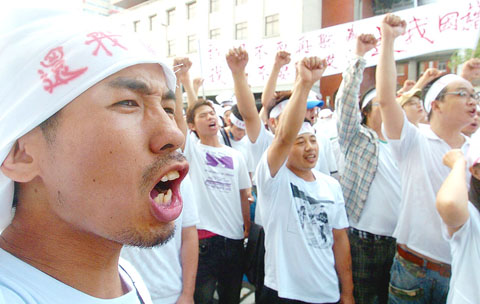More than 400 descendants of former Chinese Nationalist Party (KMT) soldiers who were left behind in Myanmar and Thailand 60 years ago demonstrated yesterday in Taipei, demanding the government grant them citizenship.
Following the KMT’s defeat in the Chinese Civil War 60 years ago, tens of thousands of its soldiers moved across the Chinese border into Myanmar and Thailand.
They became trapped there when the KMT regime collapsed in China and fled to Taiwan.

PHOTO: CHANG CHIA-MING, TAIPEI TIMES
When the governments of Myanmar and Thailand refused to grant them residency or citizenship, they became stateless.
“Although they’ve always been stateless, the government has, in the past, allowed them to come to Taiwan to study and granted them citizenship right away — sometimes within one week or one day,” said Liu Hsiao-hua (劉小華), executive director of the Thai-Myanmar Region Chinese Offspring Refugee Service Association.
Since none of them hold Thai or Myanmar citizenship, they had to come to Taiwan with forged or bought passports.
“But the government told them as long as they could get to Taiwan, it didn’t care how they did it,” Liu said.
The situation changed in May 1999 when the Immigration Act (移民法) was revised and the provision was canceled, Liu said.
However, the Overseas Compatriot Affairs Commission (OCAC) and the Ministry of Education (MOE) did not publicize the new policy and continued to recruit students in those areas.
“I came to Taiwan in 2000 and was told by the MOE that I may get permanent residency in Taiwan after five to seven years,” said Wan Chien-chu (王建菊), who came from northern Thailand and graduated from the National Taipei College of Business in February.
“I’ve received my degree, but without proper documents, I cannot take any national exams for a license and therefore I cannot work,” she said.
This was also the case for Huang Chien-pang (黃建邦), who said that his family has “been stateless for three generations.”
“After buying a forged passport and paying my tuition, I’m NT$120,000 [US$3,950] in debt,” Huang said. “So I had to quit school and began working as a construction worker to make about NT$10,000 to NT$20,000 a month.”
Huang added that without proper documents, he can’t do anything if he’s not paid, and has to pay the full cost when seeing a doctor as he has no health insurance.
However terrible their life in Taiwan is, there is no way back either.
“Since most of them came on forged passports, the Myanmar and Thai governments will not allow them to return — so they’re trapped,” Liu said.
After demonstrating outside the Legislative Yuan, they moved on to the Executive Yuan, where they were invited inside to talk with two low-level officials.
However, the representatives left the Executive Yuan disappointed.
“They only said that they would study the possibility of revising current laws, but wouldn’t give us a concrete timetable,” Liu said. “Before any changes in the law, they [the students] will still have to live illegally — meaning that they’re breaking the law even for walking on the street.”

Taiwan is to commence mass production of the Tien Kung (天弓, “Sky Bow”) III, IV and V missiles by the second quarter of this year if the legislature approves the government’s NT$1.25 trillion (US$39.78 billion) special defense budget, an official said yesterday. Commenting on condition of anonymity, a defense official with knowledge of the matter said that the advanced systems are expected to provide crucial capabilities against ballistic and cruise missiles for the proposed “T-Dome,” an advanced, multi-layered air defense network. The Tien Kung III is an air defense missile with a maximum interception altitude of 35km. The Tien Kung IV and V

The disruption of 941 flights in and out of Taiwan due to China’s large-scale military exercises was no accident, but rather the result of a “quasi-blockade” used to simulate creating the air and sea routes needed for an amphibious landing, a military expert said. The disruptions occurred on Tuesday and lasted about 10 hours as China conducted live-fire drills in the Taiwan Strait. The Civil Aviation Administration (CAA) said the exercises affected 857 international flights and 84 domestic flights, affecting more than 100,000 travelers. Su Tzu-yun (蘇紫雲), a research fellow at the government-sponsored Institute for National Defense and Security Research, said the air

Taiwan lacks effective and cost-efficient armaments to intercept rockets, making the planned “T-Dome” interception system necessary, two experts said on Tuesday. The concerns were raised after China’s military fired two waves of rockets during live-fire drills around Taiwan on Tuesday, part of two-day exercises code-named “Justice Mission 2025.” The first wave involved 17 rockets launched at 9am from Pingtan in China’s Fujian Province, according to Lieutenant General Hsieh Jih-sheng (謝日升) of the Office of the Deputy Chief of the General Staff for Intelligence at the Ministry of National Defense. Those rockets landed 70 nautical miles (129.6km) northeast of Keelung without flying over Taiwan,

A strong continental cold air mass is to bring pollutants to Taiwan from tomorrow, the Ministry of Environment said today, as it issued an “orange” air quality alert for most of the country. All of Taiwan except for Hualien and Taitung counties is to be under an “orange” air quality alert tomorrow, indicating air quality that is unhealthy for sensitive groups. In China, areas from Shandong to Shanghai have been enveloped in haze since Saturday, the ministry said in a news release. Yesterday, hourly concentrations of PM2.5 in these areas ranged from 65 to 160 micrograms per cubic meter (mg/m³), and pollutants were